Food for thoughts
May 7, 2019
Thesaurus : Soft Law
May 7, 2019
Thesaurus : Doctrine
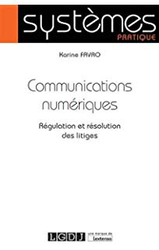
Référence complète : Favro, K., Communications numériques. Régulation et résolution des litiges, coll. "Systèmes", LGDJ Lextenso, 2019, 155 p.

Updated: May 3, 2019 (Initial publication: Feb. 7, 2019)
Publications

This working paper has served as a basis for an article subsequently published in French in the Law Journal Recueil Dalloz (see Compliance et personnalité, Recueil Dalloz, 2019).
It is enriched with notes, references and links.
Summary: Compliance Law is often presented as empty and a mechanical set of procedures, in which human beings do not matter. It is the opposite.
The concern of human beings justifies it fights against the legal technique of the personality. Indeed as Compliance Law is an legal construction around Information and even in its core function of prevention of the systemic risks and its markets protection, the Compliance Law sets the requirement to know "genuinely" the person who is "relevant" - behind the legal person - for the purpose set, for example the fight against corruption or money laundering, establishing in principe what are only exception in Corporate Law or Competition Law.
In a more European conception of Compliance Law, as Law of direct protection of human beings beyong legal personnalities, from near the company and even far, humans being the real and effective beneficiaries of the new branch of Law.
April 25, 2019
Thesaurus : Doctrine
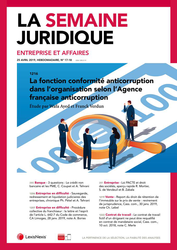
Full reference : Ayed,W., Verdun,F., La fonction conformité anticorruption dans l’organisation selon l’Agence française anticorruption, in La semaine juridique, Entreprises et Affaires, JCP, E, LexisNexis, n°17-18/1206, 25 avril 2019, pp.38-44.
Sciences Po students can read the article via the drive, folder "MAFR - Régulation - Compliance"
April 17, 2019
Teachings : Sectoral Regulatory Law 2019-2020

Même si l'expression de "régulation du numérique" est extrêmement courante, elle ne va pas du tout de soi, si l'on respecte le sens précis des mots. L'idée même de réguler cet espace contredit son origine, des principes américains - comme la liberté d'expression, ou des soucis économiques - comme l'innovation, qui renvoie plutôt vers l'Ex Post que vers l'Ex Ante auquel est toujours associé le Droit de la Régulation. En outre, le numérique peut être difficilement qualifié de "secteur", ce qui paraît mener à une impasse.
C'est pourquoi pour l'instant en premier lieu l'on s'appuie sur l'efficacité relative mais non inexistante de l'Ex Post, du droit pénal et du droit civil mais surtout l'on fait mener en première ligne le Droit de la concurrence, à la fois dans son utilisation Ex Post de mesures comportementales (obligation d'accès notamment) et dans sa partie Ex Ante qu'est le contrôle des concentrations. En outre les Régulateurs sectoriels ne sont pas arrêtés par l'immatérialité du numérique et utilisent leur pouvoir de sanction, notamment quant à l'usage des données.
Car c'est autout de la notion de "donnée" qu'une "gouvernance" pourrait prendre forme en matière numérique. Il pourrait s'agit d'internaliser dans des opérateurs numériques, en tant qu'ils tiennent mondialement le secteur, des obligations pour autrui, en trouvant un juste milieu entre une "Régulation à la californienne" basée sur des consentements mécaniques et une "Régulation à la chinoise" dans laquelle l'Etat tient tout.
Pour cela, de la même façon que le Droit de la Régulation reconcrétise le monde que le marché concurrentiel ayant pour seul critère ultime le prix, une gouvernance par la Compliance pourrait reconcrétiser le monde digitalisé par le numérique en distinguant dans une catégorie abusivement unifiée de "data" plusieurs sortes de data. L'Europe en a donné l'exemple à travers la Régulation internalisée par le Droit de la Compliance dans les entreprises lorsque les data "concerne" les personnes.
L'on peut analyser la décision rendue par la CNIL, Google le 21 janvier 2019.
Consulter les slides servant de support à la leçon.
Revenir à la présentation générale du Cours.
Consulter la bibliographie générale du Droit commun de la Régulation
Consulter le Dictionnaire bilingue du Droit de la Régulation et de la Compliance
April 16, 2019
Thesaurus : 05.3. Parlement européen
April 15, 2019
Publications : Chronicles MAFR - Compliance Law

► Full Reference : Frison-Roche, M.-A., Compliance et personnalité, in Recueil Dalloz, n°11/7812, avril 2019, pp. 604-606
_____
► Chronique English Summary: Compliance is often presented as a set of mechanical procedures, in which human beings are absent. It's the opposite.
It is an Information Law, in its function of preventing systemic risks and a markets protection Law, which poses the requirement of knowing “truly” the person who is “relevant”, generalizing what Company or Competition Law had partially admitted.
Even more, beyond systems, Compliance Law, insofar as it is a Protection Law, aims to protect human beings, directly or indirectly concerned, establishing them as legal persons, true final subjects of law of this new branch of Law.
____
📝read the chronique (in French).
____
____
📖 read the other chroniques Chronique MAFR Droit de la Compliance
________
April 8, 2019
Conferences
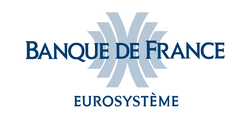
Cette participation à la table-ronde présidée par Andrea Enria, chairman du Supervisory Board du Single Supervisory Mecanism de la Banque Centrale Européenne qui a pour thème Competition and Regulation in the financial sector.
Elle-même fait partie d'une journée ayant pour thème Competition in a globalised world: the role of public policies, organisée dans le cadre du G7 France 2019 par la Banque de France et le Ministère de l'économie et des finances.
La conférence et les supports sont en anglais.
Dans la table-ronde, il m'est plus particulièrement demandé d'abord la question de la méthodologie à adopte dans le secteur financier, en raison des nouveaux acteurs digitaux, et des principes à adopter à propos des datas.
April 3, 2019
Thesaurus : Doctrine
Référence complète : Breen, E., La "compliance", une privatisation de la régulation ?, Revue de sciences criminelle, 2919, p.327.
____
March 25, 2019
Thesaurus : Doctrine
► Référence complète : Gaudemet, A, Qu'est-ce que la compliance ?, Commentaire, 2019/1, n°165, p.109-114.
___
Feb. 19, 2019
Thesaurus : 09. Juridictions étrangères
Full reference: Finantsinspektsioon, 19th of February 2019, Danske Bank
Read the Finantsinspektsioon's press release
In this decision, the Estonian financial monitoring authority forces Danske Bank to stop its activities in Estonia because of breaches to its obligations concerning fight against money laundering.
Feb. 13, 2019
Thesaurus : Doctrine

Référence générale : Patrick Wajsman (dir.), Politique internationale, dossier spécial, Investissement responsable : l'essor, n°162, hiver 2018-2019, 119 p.
Consulter le sommaire de la Revue.
Consulter la présentation des entretiens suivants :
Boujnah, S., Places boursières : promouvoir un modèle européen.
Jensen, S., Norvège : exemple d'un fonds souverain éthique.
Ribera, T., Faciliter la transition écologique : ce que peut l'État.
Feb. 13, 2019
Publications
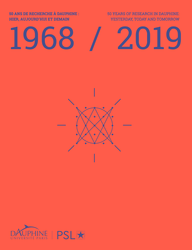
Full reference: Frison-Roche, M.-A., Creating "Regulation Law" at Dauphine, in Huault, I. and Bouchard, B. (ed.), 50 years of Research in Dauphine. 1968-2019, 2019, pp. 110-114
Read Marie-Anne Frison-Roche's article (in French)
Read also:
The foreword of the book written by Bruno Bouchard (in French)
Feb. 13, 2019
Thesaurus : Doctrine

Référence complète : Ribera, T., Faciliter la transition écologique : ce que peut l'État, in Politique internationale, dossier spécial, Investissement responsable : l'essor, n°162, hiver 2018-2019, pp. 113-119.
Feb. 13, 2019
Thesaurus : Doctrine

Référence complète : Boujnah, S., Places boursières : promouvoir un modèle européen, in Politique internationale, dossier spécial, Investissement responsable : l'essor, n°162, hiver 2018-2019, pp. 89-94.
Feb. 13, 2019
Thesaurus : Doctrine


Feb. 9, 2019
Publications

► Référence complète : Frison-Roche, M.-A., Pour une conception humaniste du Droit des affaires et de son enseignement, document de travail, février 2019
____
📝ce document de travail a été élaboré pour servir de base à un article publié un an et demie après sa remise, en novembre 2020 dans les 📘
____
Alain Couret est un grand professeur de Droit et un très bon technicien de celui-ci. On se surprend soi-même non seulement à devoir souligner cette maîtrise technique insérée dans l'activité d'enseignement mais à prévenir qu'il s'agit d'une grande qualité. Cette maîtrise technique et l'aptitude à transmettre le savoir juridique par la compréhension de ses principes de base, n'est-ce pas le métier même de professeur ? Si chacun l'admet, alors désigner ainsi Alain relèverait du pléonasme...
Mais l'on entend souvent aujourd'hui que l'art juridique ne serait plus qu'un art de tordre les textes et les mots dans tous les sens, que ceux-ci s'y prêteraient, voire qu'ils seraient faits pour cela, qu'il faudrait apprendre avant tout à argumenter et à contredire si habilement que le tiers spectateur, qu'il soit juge, auditoire ou opinion publique, sera persuadé à la fin que, dans le cas particulier auquel la discussion est cantonné, l'intérêt défendu est bien le meilleur, que c'est bien celui-ci qu'il faut protéger et non pas celui de l'adversaire, qu'il faut rendre effectif cet intérêt singulier-là. Quitte à penser différemment dans le cas suivant. D'ailleurs, il sera possible par la suite de soutenir une autre cause, puisque les situations ne sont jamais semblables. Dans cette façon de faire, connaître techniquement le Droit et ses principes de base apparaît secondaire. La technique ? Cela serait les machines qui s'en chargeront. Les principes ? Ils seraient à éviter, parce que cela ne servira à rien : à chaque cas sa solution.
Par ses enseignements et ses écrits, Alain Couret exprime le contraire : le Droit des affaires n'est pas réductible à un amas réglementaire, repose sur des principes qui reflètent la conception que l'on se fait de la place des êtres humains dans les échanges, dans l'entreprise, dans l'organisation marchande. Enseigner le Droit des affaires, c'est transmettre ces principes. C'est aussi les discuter. Ecrire, dans une continuité avec l'enseignement, c'est au besoin inventer d'autres principes, tandis que les machines continuent de stocker par milliers les dispositions techniques posées là, chacune équivalente à une autre. Enseigner des principes, seuls les êtres humains sont aptes et soucieux de le faire, à l'exemple d'Alain Couret. Si on l'oublie, alors les professeurs étant devenus des répétiteurs, les machines répéteront bien mieux qu'eux par un débit infatigable les "paquets réglementaires". Mais inventer de nouveaux principes, seuls les êtres humains ont souci à le faire, à travers des idées. Lorsqu'un auteur prit l'image d'algorithmes qui "rêvent", c'était pour mieux poser qu'ils ne le font pas!footnote-1485, tandis que Lévi-Strauss définissait l'enseignement comme le fait pour une personne particulière de rêver tout haut.
Et le Droit des affaires, n'est-à-ce pas d'imagination et d'humanisme dont il a besoin, plus que jamais, puisque l'intimité des affaires et de la technologie mécanise les êtres humains ? , à travers des personnalités comme celle d'Alain Couret, alors même que nous allons toujours plus vers un pointillisme et une déshumanisation, à laquelle sa conception réglementaire participe ?
Jan. 23, 2019
Interviews

Référence générale : Frison-Roche, M.-A., Participation à la table-ronde : De la responsabilité pénale des personnes morales à celle des dirigeants, vers une mutation du droit pénal, Lettre des Juristes d'Affaires, 23 janvier 2019, pp. 15-31.
Présentation :
En l'absence d'instance internationale, la répression des infractions des entreprises relève du droit national. Et tous les pays ne sont pas alignés.
En Allemagne, par exemple, la récente affaire du Diesel Gate a rappelé qu'il n'existait pas de régime de responsabilité pénale des personnes morales.
Aux États-Unis, elle est très lourdement réprimée. En France, elle existe depuis 1993 et s'étend sous l'influence de la Cour de cassation . Depuis l'appel de Genève en 1996, la justice s'est également attachée à mettre un terme à l'impunité qui régnait pour les dirigeants. Aujourd'hui, les mises en cause de la personne morale et du dirigeant sont quasiment systématiquement liées.
Quelle est la stratégie suivie par les institutions judiciaires françaises? Quels sont les risques encourus par les personnes physiques ? Quelles conséquences à l'introduction en droit français de la justice négociées ?
Jan. 9, 2019
Thesaurus : Doctrine
Référence complète : Vayr, J., et Lagesse, P., Le lanceur d'alerte dans tous ses états, in Petites affiches, n°007, Lextenso, 2019, p. 3.
Les étudiants de Sciences-Po peuvent consulter l'article via le Drive, dossier "MAFR- Régulation & Compliance"

Jan. 8, 2019
Publications

Jan. 8, 2019
Blog
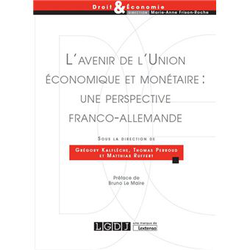
La collection Droit & Economie sort son 33ième volume.
Il est consacré à l'Europe, c'est-à-dire à l'amitié franco-allemande, puisqu'aujourd'hui c'est sur cette amitié-là que l'on peut croire encore à l'Europe.
Si l'on a une vision politique des espaces, alors c'est la notion d'amitié qui doit ressortir.
C'est autour d'elle que Bruno Le Maire a construit sa préface : lire la préface que le ministre de l'économie et des finances a fait à l'ouvrage.

Jan. 2, 2019
Publications

► Référence complète : M.-A. Frison-Roche, "What can Compliance Law build relying on the European Humanist Tradition", Working Paper, January 2019.
____
This working paper has served as a basis for an article published in French in the collective publication Pour une Europe de la Compliance in the serie Regulation & Compliance.
____
Compliance is often presented as a complex, technical, almost incomprehensible set, in that it consists only of empty and moving procedures, mechanical corpus about which the goal would be a question that would not arise.
The question of the purpose of these huge compliance devices might not even have to be asked. And this for two reasons.
Firstly it would only be a matter of following "processes", that is, mechanical and endless procedures. This conception of compliance is often called "kafkaes". Closer to closer, one thinks first of all of the book written by Kafka's The trial l and Welles' adaptation to the cinema in which the charcters are surrounded by walls that are narrowing around them, but it is rather to his novel In the penal colony that must be thought, that is to say to a procedural system of isolation which we do not understand the foundation, which makes it without foundation and without end but also which takes mainly the form of a machine in which the person is placed and which mechanically writes the Law on and under the skin of his back. This internalization of the rule in the body of the condemned - that the French legal system before the French Revolution associated only with "enormous crimes" - being the ordinary way of actual and ordinary application of the rules can correspond to a certain vision of the Compliance, detached from any purpose.
The question of the purpose of Compliance may also not have to arise for a second reason, almost the opposite: they would always be devices that are specific to particular sectors. Thus, the banking sector, the insurance sector, the drug sector, the agri-food sector, the telecommunications sector, the energy sector, etc. Then the opposite happens: too many goals! Since each of these sectors has specificities such that it includes purposes that are specific to each of them. For example continuity for energy, access information for telecommunications, control of systemic risk for banking and finance, protection and secret for private information, etc. Now, either these ends so diverse are indifferent to each other, or they can contradict each other. Therefore, to ask the question of the purpose of compliance mechanisms would be to move to the stitution of not even trying to understand "processes" to be exceeded by too many substantial purposes pursued at the same time and in contradictorily senses ... .
This is why the question of the purpose of the Compliance is not asked in a main way. Even less if it is superimposed with another goal that is the European construction ....
But on the contrary, if we confront this question of the aims of the Compliance Mechanisms by crossing it with another issue, older but also under construction, namely the question of Europe, it is possible to make an alliance of these two difficulties to transform them as an asset. That one can help the other. Indeed, both Europe and Compliance in their current states are two constructs with uncertain goals or behaviors most often only "reactive" (I). If we do not want to mobilize all our strength to limit our weakness, which leads rather to feed it, we can go draw on the unity of this Europe so diverse but which finds it unity in the protection of the human being by the very idea of "person". However, Compliance Law can have the same unity, despite the diversity of sectors, and thus fill the meaning of these multiple procedures, providing the balance between information and secrets, circulation of data and conservation of that they concern, common and dialectic purpose that this European Compliance Law. in the process of being constituted can give the world an example in relying on the European tradition (II).
Dec. 19, 2018
Blog
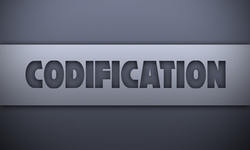
Portalis aurait-il pu imaginer cela, tandis qu'il concevait son Discours préliminaire au Code civil ?
Tandis qu'au bout de la table de travail Napoléon écoutait les 6 jurisconsultes construire ce qui fût appelé la "Constitution civile" de la France, aurait-il pu imaginer cela ?
Une directive se prépare pour établir un "Code européen des communications électroniques".
A lire ce texte, l'on ne retrouve rien de ce qui est si souvent décrit comme "l'art de la codification", ce qui distinguerait - au sens fort du terme - le Droit continental - des autres systèmes.
Il convient donc de décrire ce que sera ce "Code européen des communications" (I) avant de se demander ce qu'il aurait pu être ...(II).
Dec. 19, 2018
Thesaurus : Doctrine
Dec. 17, 2018
Editorial responsibilities : Direction de la collection "Droit et Économie", L.G.D.J. - Lextenso éditions (30)
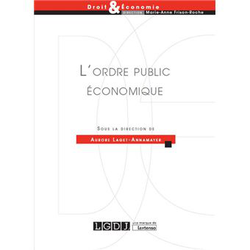
Full reference : Laget-Annamayer, A. (ed.), L'ordre public économique ("Economic Public Order"), coll. "Droit et Économie", LGDJ - Lextenso éditions, 2018, 397p.
This collective book is published in French.
This is the 32nd volume published in this collection.
Often launched as an all-encompassing expression, both by the doctrine and by the judge, public economic order remains a mysterious concept whose substance and contours are difficult to know, simply because it is liable to fluctuate according to its apprehension and depending on the economic and social context.
Yet the expression has become widely used, almost incantatory, like a label, and there is therefore undoubtedly a gap between its invocation and its meaning in Law. It is to this discrepancy, and in an attempt to reduce the mystery, that this work is devoted. Not stopping at the only vision of public economic order in internal Public Law, he tries to seek the meanings of it in Comparative Law, in European and International Law, without omitting the historical, privatist or economic vision. It is therefore to this rich overview treated by specialists from different legal fields and beyond that this book invites. It does not aim to put an end to the debate, but on the contrary to arouse it in the context of reflections on the relationship between Law and Economics of which everyone knows the importance.
Authors are :
- Olivier Baillet,
- Jacques Caillosse,
- Aurélien Camus,
- Jacques Chevallier,
- Dominique Custos,
- Pierre Delvolvé,
- Samuel Ferey,
- Sébastien Hourson,
- Pascale Idoux,
- Jean-Philippe Kovar,
- Aurore Laget-Annamayer,
- Jérémy Martinez,
- Francesco Martucci,
- Jeanne Mesmin d’Estienne,
- Claire Mongouachon,
- Eric Naim-Gesbert,
- Guillaume Richard,
- Jean-Marc Sorel,
- Pascal de Vareilles-Sommières.